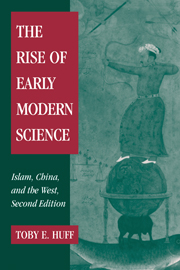Crossref Citations
This Book has been
cited by the following publications. This list is generated based on data provided by Crossref.
Kuran, Timur
2000.
The New Cambridge History of Islam.
p.
473.
Anderson, Jon W.
2000.
The New Cambridge History of Islam.
p.
648.
Brown, L. Carl
2000.
The New Cambridge History of Islam.
p.
385.
Dallal, Ahmad S.
2000.
The New Cambridge History of Islam.
p.
107.
Watson, Andrew M.
2000.
The New Cambridge History of Islam.
p.
290.
Welchman, Lynn
2000.
The New Cambridge History of Islam.
p.
411.
Suraiya, N. Faroqhi
2000.
The New Cambridge History of Islam.
p.
306.
Vogel, Frank E.
2000.
The New Cambridge History of Islam.
p.
296.
Davis, Dick
2000.
The New Cambridge History of Islam.
p.
414.
Taylor, Richard C.
2000.
The New Cambridge History of Islam.
p.
532.
Feener, R. Michael
2000.
The New Cambridge History of Islam.
p.
37.
Hefner, Robert W.
2000.
The New Cambridge History of Islam.
Haq, S. Nomanul
2000.
The New Cambridge History of Islam.
p.
640.
Irwin, Robert
2000.
The New Cambridge History of Islam.
Leonard, Karen Isaksen
2000.
The New Cambridge History of Islam.
p.
238.
Guo, Li
2000.
The New Cambridge History of Islam.
p.
444.
Zubaida, Sami
2000.
The New Cambridge History of Islam.
p.
269.
Ayalon, Ami
2000.
The New Cambridge History of Islam.
p.
572.
Lawrence, Bruce B.
2000.
The New Cambridge History of Islam.
p.
355.
Bonner, Michael
and
Hagen, Gottfried
2000.
The New Cambridge History of Islam.
p.
474.





